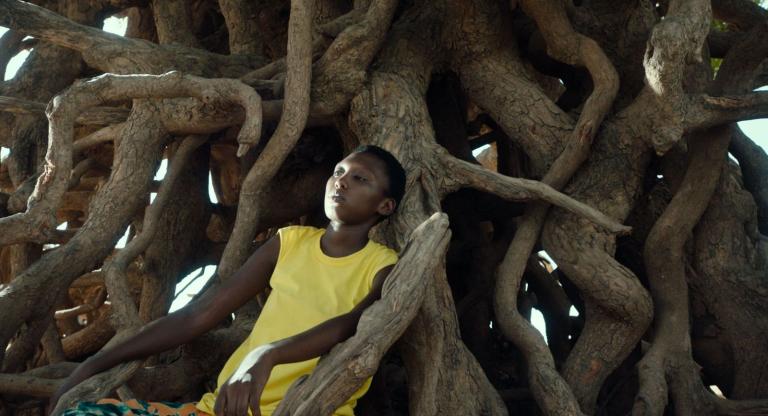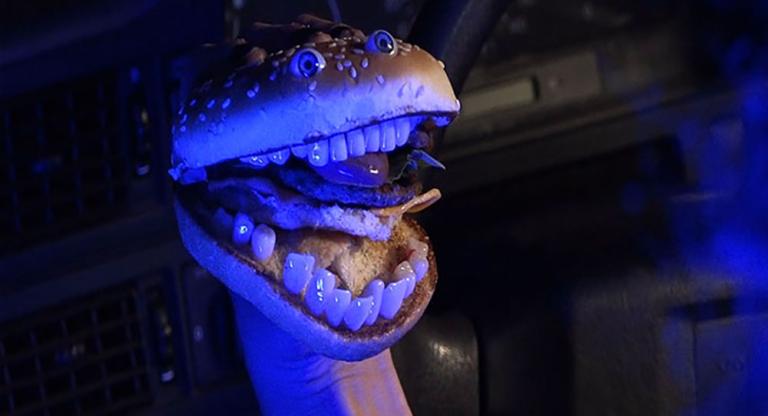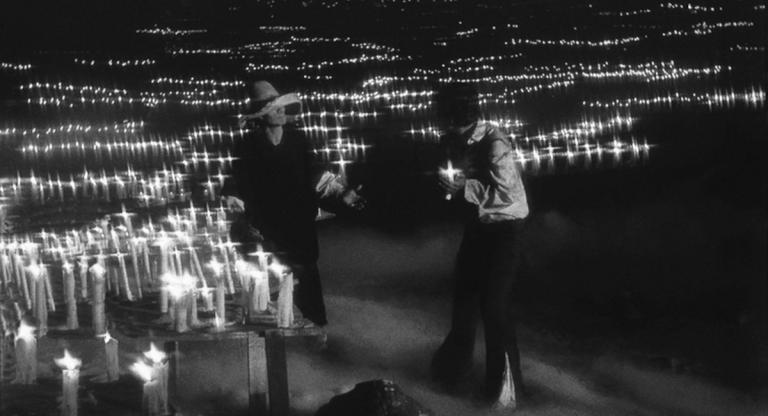Engineer Michael Grant (Robert Walker Jr.), sporting delightfully winged hair and a wide necktie, studies the aging brickwork of the London Bridge on a chilled misty evening in 1968. Tasked with gauging the bridge’s structural feasibility, he’s distracted by a willowy blonde figure on the periphery of the local sex workers’ circle. When he approaches and she removes her purple sunglasses, sparks fly and the two tumble in his hotel room through the night. She is Olivia (Suzanna Love), dressed in come-hither boots and wearing flaming red lipstick, but with a retiring, fragile demeanor. Their blossoming love affair is cut short when her abusive husband, Richard (Jeff Winchester), discovers them days later in a passionate embrace beside the river. The two men scuffle: Richard falls into the water, Olivia runs off into the distance, and Michael is left to wonder what might have been. That is, until 15 years later, on a trip to visit the London Bridge in Lake Havasu, Arizona, where the original foundations have been transported and rebuilt to draw in tourists with a taste for quaint, UK-themed attractions. Michael spies a woman whose brunette locks, bookish glasses, and Western accent cannot dissuade him of her true identity. Olivia—or Jenny, as she introduces herself—is a single real estate agent, clearly attracted to Michael but slow to acknowledge what he believes is their shared past. If she is Olivia, will she risk revisiting her troubled English past to rekindle their singularly febrile flame?
Such would be a compelling narrative for an erotic thriller, with a stifled housewife stealing away to freedom and a tourist attraction bridging the psychosexual and geographical gaps between star-crossed lovers. But Olivia’s (1983) director Ulli Lommel isn’t merely riffing on Alfred Hitchcock’s Vertigo (1958), he is also referencing Psycho (1960) and Marnie (1964), and dipping a cinematic toe into the convoluted plotting, saturated hues, and electronic scores of giallo films. We first meet Olivia as she witnesses her mother’s strangulation at the hands of an American GI through her bedroom keyhole, a formative incident that troubles her grasps at independence and romance throughout her misadventures in life. Olivia hears voices, uses wardrobe changes and hair dye to escape her brutally simplified identity, keeps pet birds in her various bedrooms and stuffed animals throughout her homes, and reacts to affection with both excitement and horror, remaining always a child and a murderer trapped in one beguiling body. She clings to the symbolic site of the traumas of her past, traveling across continents to stay within easy distance of the London Bridge that served as the hefty-yet-crumbling backdrop to the fairytale fantasies of marriage and disturbing gendered violence of her youth. To describe what happens after she and Michael reconnect isn’t necessarily to spoil a twist, but rather, to deflate a little bit of the magic of this film’s weirdly haphazard construction, carried effectively through by star and Lommel’s then-wife Suzzana Love’s charisma and the eerier interludes of Joel Goldsmith’s otherwise easy-listening score.
Olivia is largely bereft of the brittle social commentary of Lommel’s early masterpiece, The Tenderness of Wolves (1973). That film was produced by and featured Rainer Werner Fassbinder, for whom Lommel was a frequent star, and skewered the insatiable hunger the ordinary denizens of early twentieth-century Hanover had for fresh meat and stability. Having moved to the United States in 1977 and collaborated with Andy Warhol and other Factory artists on Cocaine Cowboys (1979) and Blank Generation (1980), Lommel then immersed himself in schlocky genre mayhem throughout the rest of his career, beginning with The Boogeyman (1980). What Lommel’s ‘80s films lose in Wolves’ ironic distance, they gain in charming sleaze—with increasingly diminishing returns after Olivia. That the nighttime UK violence of the film’s first half continues into the sunny, plastic daylight of her second life in Arizona proves an interesting metaphor for Lommel’s descent from Fassbinder-collaborator to a low-budget bizarro who made musicals and serial killer trash on this side of the Atlantic, and perhaps it explains Lommel’s fascination with the relocation and reconstruction of the stalwart London Bridge.
Olivia screens tonight, March 14, at Nitehawk Williamsburg on 35mm as part of the series “The Deuce.”



